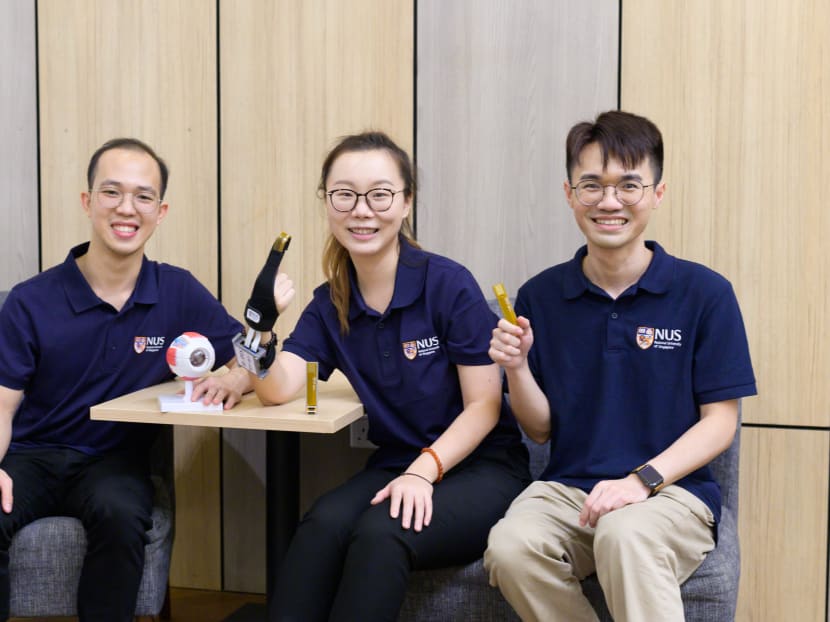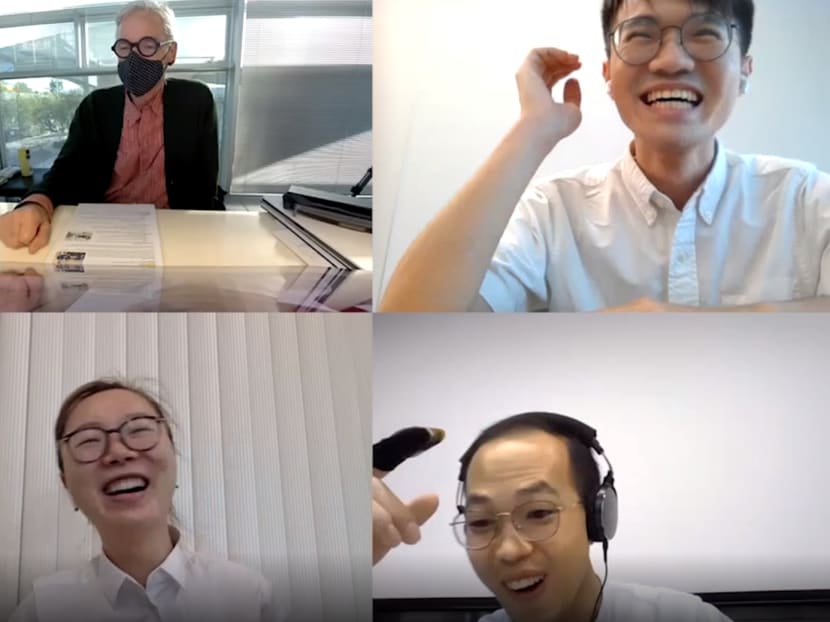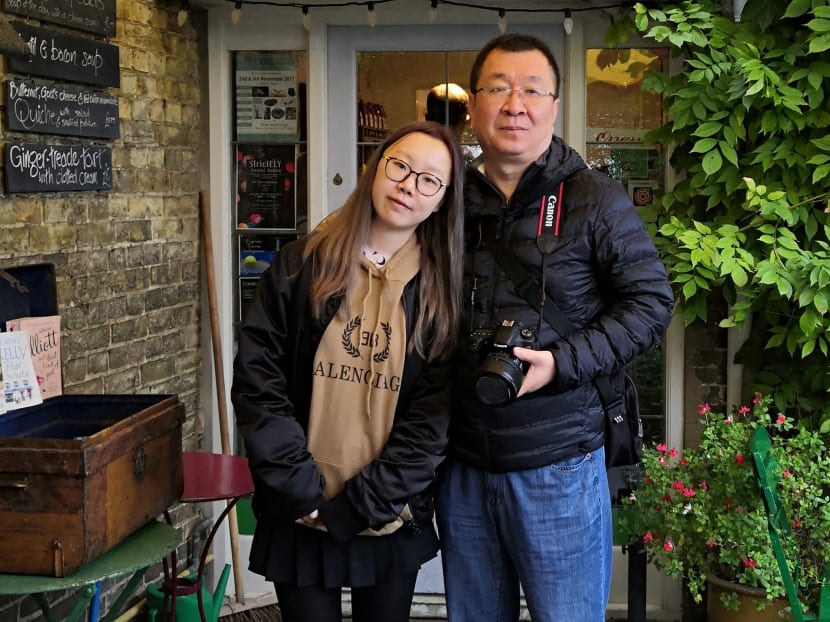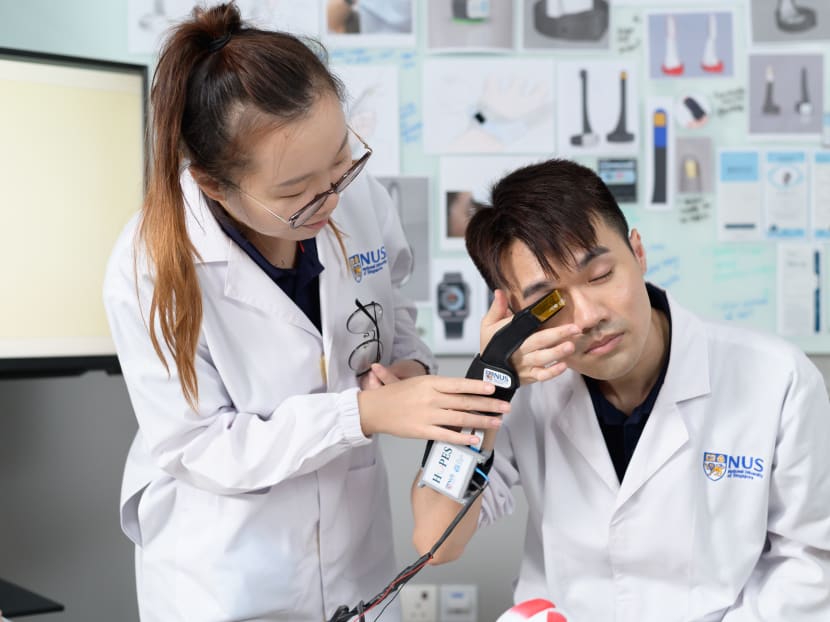Dad’s glaucoma tests spur NUS student to invent pain-free device. Now it’s a James Dyson Award winner
SINGAPORE — When her father was diagnosed with glaucoma in late 2019, Ms Yu Kelu saw the amount of pain it caused him. He suffered from frequent headaches and blurred vision, and was constantly in and out of the hospital to get his eye pressure tested. These eye pressure tests, also known as intraocular pressure monitoring, are not for the faint-hearted.
- A Singapore team invented an eye-test device to become one of the top winners for the James Dyson Award
- They were chosen from more than 2,000 entries across 28 countries and regions to bag a prize in the international winner category
- The team from NUS won S$53,000 to further develop and enhance the device
- One of the team members wanted to do something after witnessing her father going through agonising eye tests
- The team had a video call with British engineer James Dyson, who also has glaucoma
SINGAPORE — When her father was diagnosed with glaucoma in late 2019, Ms Yu Kelu saw the amount of pain it caused him. He suffered from frequent headaches and blurred vision, and was constantly in and out of the hospital to get his eye pressure tested.
These eye pressure tests, also known as intraocular pressure monitoring, are not for the faint-hearted.
Ms Yu, 26, told TODAY on Wednesday (Nov 17) that a probe is pressed directly against the cornea of a patient — a process that is repeated every two to three hours over a 24-hour period.
“It's quite a painful process,” she said. Ms Yu is a postdoctoral student with the department of materials science and engineering at the National University of Singapore (NUS).
The ordeal her father, who is now 55 years old, went through was enough to motivate Ms Yu, a China national, and her teammates — compatriot Li Si and Singaporean David Lee — to invent a less intrusive and portable device for testing a glaucoma patient’s eye pressure at home.
Mr Li, 28, is a postdoctoral candidate from the Institute for Health Innovation and Technology at NUS, while Mr Lee, 26, is a research assistant at the same department as Ms Yu.
Their invention, called the Home Eye Pressure E-skin Sensor, or Hopes for short, outshone more than 2,000 other entries from across 28 countries and regions to bag this year’s international winner of the James Dyson Award.
The award gives cash prizes to promising inventions from young engineers and scientists in various countries, to help them make their product commercially viable.
This is the first time there is a Singapore winner since the yearly competition began in 2005 and the first time three global winners were chosen, each receiving prize money to support the next stages of their inventions.
Ms Yu and her team-mates will receive S$53,000, which will be used to develop the product further, she said. NUS will also receive S$8,800 in recognition of their win.

Hopes is a self-test device worn like a glove. There are sensors at a fingertip that users can place against their eyelids to obtain information about their eye pressure with the aid of artificial intelligence.
The data can either be transmitted via Bluetooth to paired devices or uploaded to a computer cloud storage to be accessed remotely by clinicians.
VIDEO CALL WITH JAMES DYSON
Speaking on behalf of her team after the winners were announced on Wednesday, Ms Yu said that they got the news that they had won in October and they thought they were still undergoing the judging process when they were told to attend a video conference call.
To their surprise, the famous British billionaire engineer himself, Mr James Dyson, was part of the call and they then tried to explain to him how their invention works.
“At the very end, he broke the news to us (that we had won) and we were stunned and mindblown,” Ms Yu said.
“I felt very emotional, too, because it's such a personal matter for me.”
Ms Yu said that Mr Dyson also shared his thoughts on the project with them.
Having undergone glaucoma tests himself while he was applying for a driving licence in Singapore, Mr Dyson told them that he understood how painful eye pressure tests are.
The inventor said in a media statement on Wednesday that although they are unpleasant, glaucoma tests are vital.
“This group of young people have tackled a problem that doesn’t affect them directly, but which affects members of their family,” he said.

The National Center for Biotechnology Information in the United States said that glaucoma is the second leading cause of blindness worldwide.
In Singapore, about 3 per cent of people over the age of 50 have glaucoma and, while there is no cure, blindness can be prevented if it is diagnosed and treated early.
GETTING HELP WITH MEDICAL KNOWLEDGE
Ms Yu said that Hopes was initially part of a research project the team was working on early this year, and they decided to submit it for the James Dyson Award around March when they saw that it met the requirements — which was to design something that solves a problem.
Along the way, the team had to find solutions for certain problems, for example, having to account for different “eye factors” such as the texture of a person’s eyelid, cornea irregularities or even scarring.
Other challenges included filling the gaps in knowledge since they have no medical expertise.
They thus collaborated with Associate Professor Victor Koh, the head and consultant for the department of ophthalmology at the National University Hospital.
Aside from providing medical advice, Assoc Prof Koh and his team also gave the Hopes team a chance to conduct clinical trials on glaucoma patients.

Assoc Prof Koh told TODAY that he was "humbled and grateful" that the judging panel appreciated the winning team's innovativeness and the magnitude of the unmet clinical need that they are trying to address.
"This achievement will certainly increase the public awareness of glaucoma and brings hope in reducing glaucoma blindness," he said.
On the device’s potential, Assoc Prof Koh said that it raises the possibility for doctors and patients to measure eye pressure outside the usual office hours.
"This could facilitate earlier detection and monitoring of glaucoma. With increased access to eye pressure monitoring, patients may be more likely to adhere to their treatment and seek medical help if their eye pressure is outside normal limits."
‘FOR MY FATHER’
In any case, Ms Yu said that the team is not resting on its laurels after the win.
The prize money will be used to improve its portability, for instance.
Right now, the glove needs to be connected to another device that takes up about a third of a person’s forearm when worn.
“We want to design Hopes into something smaller... like a smartwatch,” she said, adding that the team also intends to continue conducting clinical trials and improve the sensor’s accuracy.
“I would really like to make Hopes work and bring it back to my dad,” Ms Yu said.
CLARIFICATION: The researchers have clarified their titles and affiliations. Ms Yu Kelu is a postdoctoral student with the NUS department of materials science and engineering, while Mr Li Si is postdoctoral candidate from the Institute for Health Innovation and Technology at NUS. Mr David Lee is a research assistant at the same department as Ms Yu.












